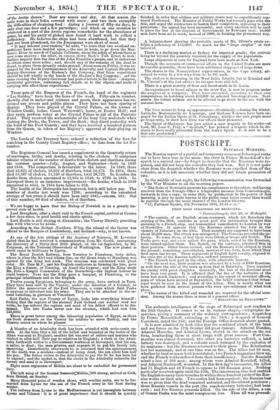POSTSCRIPT.
SATURDAY MORNING.
The Russian report of a partial and temporary success at Sebastopol turns out to have been true in the main : the error in Prince Menschikoff's de- spatch is a natural one—he forgot to describe that the Russians were re- pulsed, and did not keep the redoubts they had won. But it is not quite clear from the despatch whether the Russians were expelled from all the redoubts, as it is left uncertain whether they did not retain possession of two.
In the middle of last night, the following communication was forwarded by the War Minister to all the morning papers.
"The Duke of Newcastle presents his compliments to the editor, and having received from the Foreign Office a telegraphic message from Constantinople, forwards to him a copy, in order that, by publication in the papers of this morning, it may be made known to the public some hours sooner than would be possible through the usual channel of the London Gazette. "17, Portman Square, 4th November 1854, 12.45 a. In."
PROM LORD STRATFORD DE REDCLIFFE.
" Constantinople, Oct. 28, at .31"klnight.
" The captain of an English steam-transport, which left Balaclava the evening of the 26th, confirms in great part the information brought this morning by a French ship, and transmitted immediately to London by way of Marseilles. It appears that the Russians attacked the forts in the vicinity of Balaclava on the 25th. Their numbers are supposed to have been about 30,000 men. The attack was unexpected. The Cossacks preceded the in- fantry. To resist them, at first there were Ottoman troops and Scotch. The Turks gave way, and even spiked the guns, which, seized by the Russians, were turned against them. The Scotch, on the contrary, remained firm in their position. Other forces arrived, and the Russians were obliged to yield the ground ; remaining, nevertheless, masters of two forth, from which they fired upon our troops. Three regiments of English light cavalry, exposed to the cross fire of the Russian batteries, suffered immensely.
"The French took part in the affair, with admirable bravery. "On the next day, their position was attacked by a body of 8000 Russians, as well from the side of the town as from that of Balaclava. They repulsed the enemy with great slaughter. Generally, the loss of the Russians must have been very great. It is affirmed that the fire of the batteries of the town had much slackened ; and according to the report of wounded officers, some of whom have arrived at Buyukehlre, the belief continued that Sebas- topol would be soon in the hands of the Allies. This is nearly what has been gathered from several persons who were eye-witnesses of what took place. " The names of the killed and wounded are reserved for the official occa- sion. Among the names there is none of a general officer.
" STRATFORD DE REDCLIETR."
The authentic intelligence of the siege of Sebastopol now reaches to the 26th October. It comes to us in various shapes,—telegraphic de- spatches, giving a summary of the ordinary correspondence ; despatches by Prince Menschikoff, extending to the 18th ; a despatch of General Canrobert, dated the 23d; and the Foreign Office despatch above quoted.
It is now admitted by both sides that the combined attack of the land and sea forces on the 17th October did great damage. Admiral Dundas, Admiral Hamelin, and Admiral Lyons, shared in the attack on the sea forts, bombarding them at short range with great success. Fort Con- stantine was almost destroyed, two other sea batteries suffered, a land battery was destroyed, and a redoubt much damaged by the explosion of its magazine : but the Russians returned to their guns. The Retribution lost her mainmast, and at one time was on fire. The Allies lost 96 men, whether by land or seaor both is notstated ; two French magazines blew-up, and the French works suffered from their insufficiency. But the Russians admit a loss of 500 men ; among whom were Admiral Kornileff, killed, and Admiral Nachimoff, wounded. In this first day's encounter, the Allies had 71 English and 46 French to oppose to 130 Russian guns. Nothing particular occurred again until the 25th. The intervening time had enabled the English to carry their trenches to within three hundred yardsof the Rus- sian works on their side. Two sorties had been repulsed ; the Russian loss 7 was so great that the dead remained unburied, and threatened), i„,,,,i,:ence ; three Russian vessels in the port (the supplementary batteries) had been sunk ; and five Russian generals killed. On the side of the ' a son. of Osman Psalm was the most conspicuous loss. Thus all was proceed-
























 Previous page
Previous page